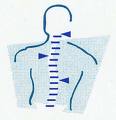Orexin A for Ridding Yourself of the Annoyance of Having to Sleep
Sometime ago, I had read that the two neuropeptide hormones known collectively as orexins had the characteristic of promoting wakefulness. I had also read that dysfunction regarding the body's regulation of orexins causes narcolepsy.
Well, today I came across an interesting article on one of the hormones in this group. According to this article (found in Wired and linked below), Orexin A, when delivered in a nasal spray, can reverse the effects of sleep deprivation in monkeys. And it may be used as a treatment for severe narcolepsy.
Amazing. However, the first thing that popped into my head when I read this was..."I wonder how long it will take them to consider the military applications?". And then I reread the first paragraph of the article and realized, "hey, they already have".
The delivery system for Orexin A was developed as a result of funding provided by DARPA, the defense advanced research projects agency (Imagine, if you will, soldiers that trudge on endlessly, without the need for sleep, only succumbing, at some point, to metabolic failure--a scary proposition).
Of course, as the article states, the ability to combat sleepiness by focusing on brain biochemistry doesn't address another issue, which is this: our bodies engage in active self-repair during periods of deep sleep (delta-wave sleep). Meaning that even if an individual could be made to feel completely rested despite severe sleep deprivation, they could still be at risk for physical problems, possibly cardiovascular in nature.
Snorting a Brain Chemical Could Replace Sleep
|
Return to VitaminStuff Homepage: 
|








